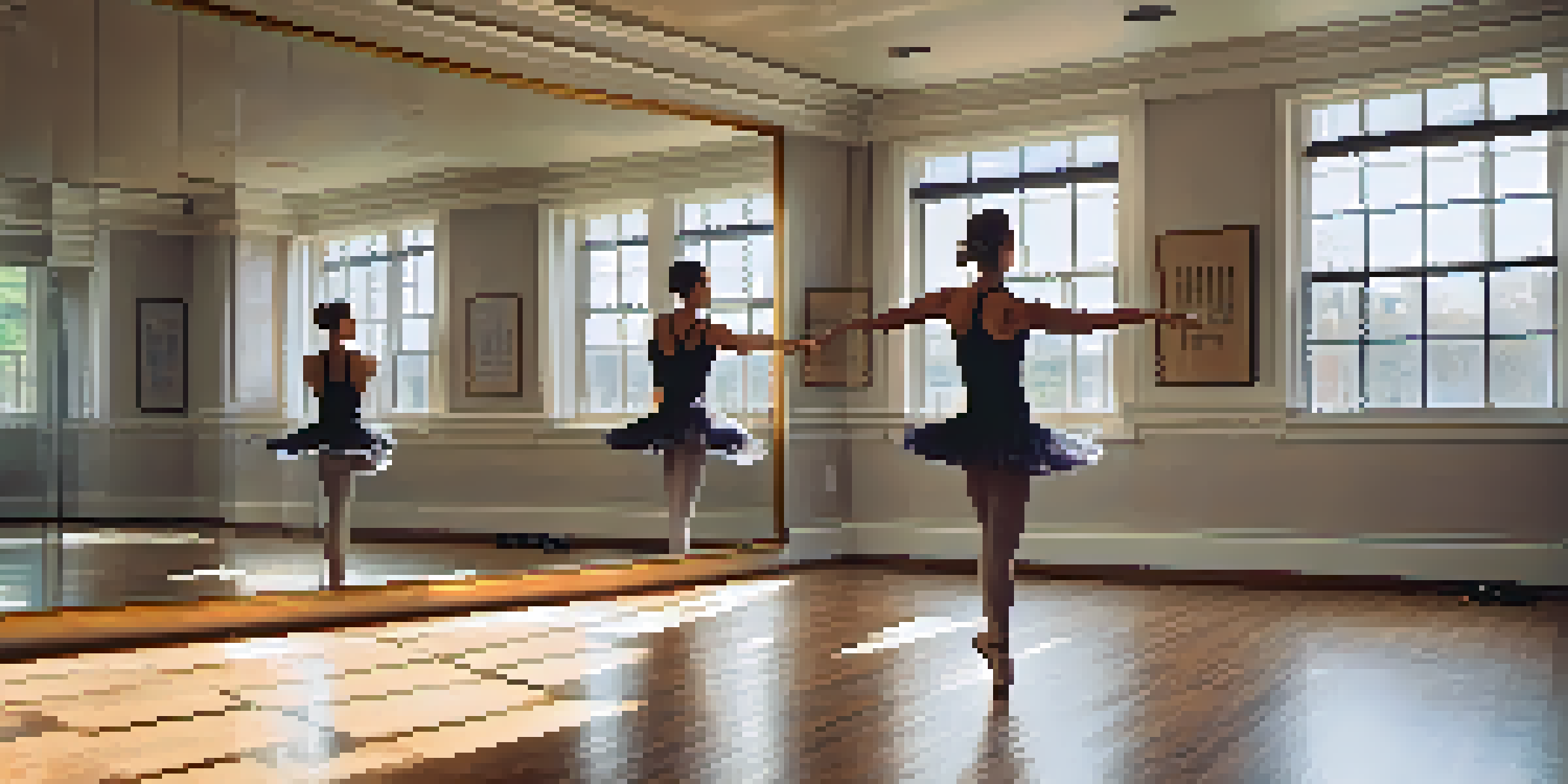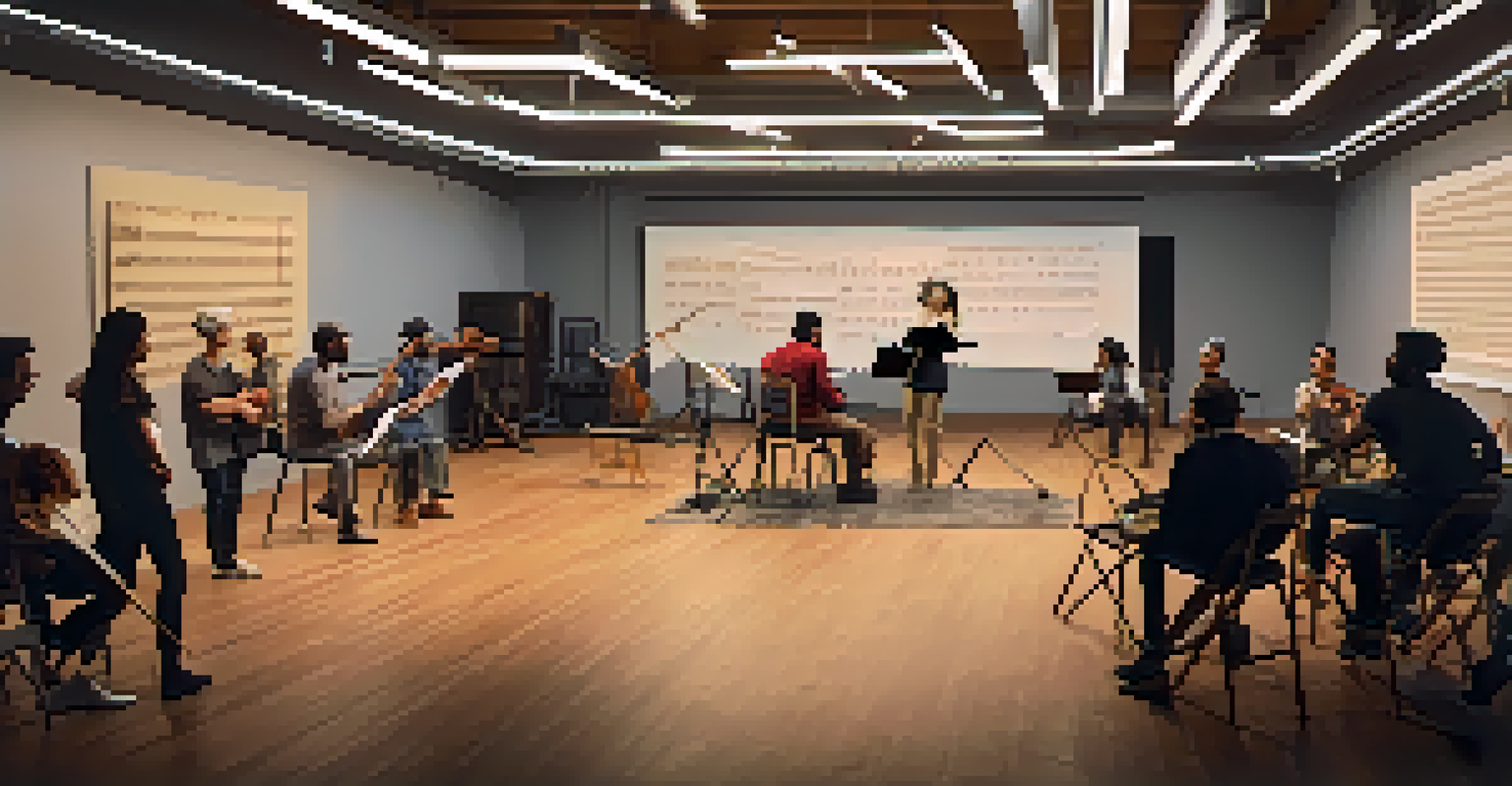The Benefits of Recording Rehearsals for Performance Review

Enhancing Self-Awareness Through Recorded Feedback
Recording rehearsals allows performers to see themselves in action, which can be eye-opening. Often, we are unaware of our habits, body language, and vocal nuances until we view them from an outside perspective. This self-awareness is crucial for personal growth and improvement.
The best way to predict the future is to create it.
For instance, a dancer may think they have perfect form but could notice flaws in their posture when watching a video. Recognizing these issues firsthand can motivate performers to refine their techniques. Self-awareness fosters a more accurate understanding of one’s strengths and areas for improvement.
Moreover, this process can help performers develop a more critical eye, enabling them to assess their performances more objectively. With this newfound awareness, artists can set specific goals for their next rehearsal, making their practice sessions more effective.
Capturing Progress Over Time for Motivation
Recording rehearsals not only offers immediate feedback but also serves as a fantastic tool for tracking progress over time. By comparing older recordings to newer ones, performers can visually witness their growth and improvements. This tangible evidence can be incredibly motivating.

For example, a musician might listen to an early rendition of a piece and notice the significant strides they've made in technique and expression. Celebrating these milestones can instill a sense of accomplishment, encouraging continued dedication and hard work.
Boost Self-Awareness with Recordings
Recording rehearsals helps performers recognize their habits and areas for improvement, fostering personal growth.
Additionally, these recordings can provide a sense of nostalgia and pride, reminding performers of their journey and the effort invested. Such motivation can be a powerful driver for consistent practice and performance enhancement.
Facilitating Constructive Critique from Peers
Sharing rehearsal recordings with peers opens the door to constructive feedback, creating a collaborative environment for growth. When others can see and hear your performance, they can provide valuable insights that you might have missed. This peer review process can lead to richer discussions about techniques and interpretations.
Self-awareness is not just about being honest with ourselves; it's about being honest with the world.
For example, a theater group might record their rehearsals and then convene to discuss what worked and what didn’t. These discussions can lead to innovative ideas and fresh perspectives that enhance the overall performance. Engaging with peers can also build stronger relationships and foster a supportive community.
Ultimately, constructive critique helps performers refine their skills while building confidence in a safe space. This collaborative effort can elevate the quality of the final performance significantly.
Identifying Patterns and Trends in Performance
One of the hidden benefits of recording rehearsals is the ability to identify patterns and trends in performance. By reviewing multiple recordings, performers can spot recurring issues or situations that impact their delivery. This insight is invaluable for making adjustments to improve overall consistency.
For instance, a public speaker might notice they tend to rush through certain sections of their speech. Recognizing this pattern allows them to focus on pacing during practice. By addressing these trends, performers can work towards more polished and confident performances.
Track Progress for Motivation
Comparing old and new recordings allows performers to visually witness their growth, providing motivation to continue improving.
Additionally, tracking these patterns over time can aid in preparing for specific audiences or events. This data-driven approach empowers performers to tailor their practices and performances more effectively.
Enhancing Memory Retention and Recall
Recording rehearsals can significantly enhance memory retention and recall for performers. The combination of seeing and hearing oneself in action aids in solidifying information and techniques in the brain. This multisensory experience is proven to help with learning and skill acquisition.
For example, a singer who records their vocal exercises can replay them to reinforce the correct techniques and pitches. This reinforcement can lead to improved muscle memory, making it easier to recall specific notes or phrases during live performances.
Furthermore, reviewing recordings can provide a comforting reassurance before a big performance, boosting confidence. Knowing that they have practiced thoroughly can ease nerves and enhance overall performance quality.
Tailoring Rehearsals Based on Recorded Insights
Once performers have recorded their rehearsals, they can tailor future practice sessions based on the insights gained. This targeted approach allows for more efficient use of time and effort, focusing on the areas that need the most attention. Rather than practicing blindly, performers can strategize their rehearsals.
For example, if a dancer notices a particular sequence is consistently challenging, they can dedicate extra time to that section. This intentional practice can lead to more significant improvements over time, turning weaknesses into strengths.
Enhance Skills Through Peer Feedback
Sharing rehearsal recordings with peers encourages constructive critique, leading to richer discussions and collaborative growth.
Additionally, this approach encourages a proactive mindset. Instead of waiting for a performance to reveal shortcomings, performers can address issues head-on, resulting in a more confident and polished final presentation.
Creating a Video Library for Future Reference
Recording rehearsals creates a valuable video library that performers can refer back to in the future. This archive serves as a rich resource for reflection and learning, offering insights into past performances and the evolution of skills. Having access to this library can inspire creativity and innovation in future work.
For instance, an artist may revisit an old recording to draw inspiration for a new project. They might discover techniques or ideas that resonate with their current artistic direction. This ability to look back on one’s journey can be incredibly motivating and insightful.

Moreover, this library can be shared with mentors or coaches, providing them with a comprehensive understanding of the performer’s growth. This holistic view can lead to more meaningful guidance and support as they continue to develop their craft.
Building Confidence Through Review and Reflection
Finally, the practice of recording and reviewing rehearsals can significantly boost a performer's confidence. By witnessing their growth and progress, performers can cultivate a strong sense of self-assurance in their abilities. This confidence is crucial when it comes time for a live performance.
For example, a performer who has diligently reviewed their rehearsals will feel more prepared and self-assured when facing an audience. The reassurance that comes from seeing their hard work pay off can alleviate nerves and enhance their overall performance.
Additionally, this process encourages a reflective mindset, allowing performers to celebrate their successes and learn from their mistakes. Embracing both the highs and lows can create a more resilient performer, ready to tackle new challenges with confidence.